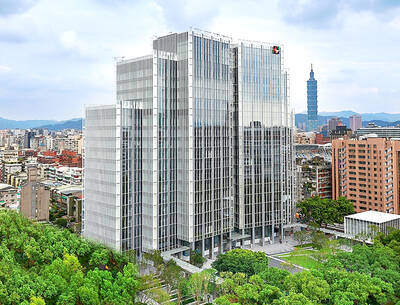China's consumer prices rose sharply last month, tying a decade-high monthly inflation rate of 6.5 percent, the government reported yesterday, adding to pressure for measures to cool a politically sensitive surge in food prices.
Food prices jumped 17.6 percent in October over the same month last year, while the price of pork, China's staple meat, soared 54.9 percent, according to the National Bureau of Statistics.
The overall October inflation rate was higher than the 6.2 percent reported in September and matched August's 6.5 percent, the highest rate in 11 years.
"We expect more monetary tightening to rein in inflation, including further rate hikes," Lehman Bros economist Sun Mingchun (孫明春) said in a report to clients.
Inflation has surged in recent months because of double-digit increases in food prices that have been blamed on shortages of pork and other basic goods.
The food price spike is especially sensitive for the communist government because China's poor majority spends as much as one-third of its income on food.
A deputy central bank governor said last month that the government expects inflation for the full year to be 4.5 percent, overshooting the official target of 3 percent.
Inflation for non-food items last month was just 1.1 percent, the statistics bureau said.
Beijing froze prices of cooking oil and other basics in September, and is pressing farmers to raise more pigs, promising free vaccinations and other aid. Economists say price pressure should ease when a new grain crop is harvested and more pigs come to market.
Farmers had been reluctant to raise more pigs in part because of an outbreak of blue ear disease, which killed 70,000 animals and prompted the government to destroy thousands more. The government declared last week it had brought the outbreak under control.
An official of China's top planning agency, the National Development and Reform Commission, said last month that the government would consider investment curbs and other unspecified "measures to adjust prices."
The government also said last month that pork prices fell in August because of increased supplies. There was no immediate explanation yesterday for last month's sharp price increase.
Regulators raised state-set prices for diesel and gasoline by 10 percent on Nov. 1 in an effort to curb demand amid a fuel shortage. But the government said that this should add only 0.05 percentage points to the monthly inflation rate.
The government has raised interest rates several times this year to curb a boom in construction and investment that regulators worry may lead to financial problems. Economists say the inflation spike is a result of food shortages and has nothing to do with those concerns.

UNCERTAINTY: Investors remain worried that trade negotiations with Washington could go poorly, given Trump’s inconsistency on tariffs in his second term, experts said The consumer confidence index this month fell for a ninth consecutive month to its lowest level in 13 months, as global trade uncertainties and tariff risks cloud Taiwan’s economic outlook, a survey released yesterday by National Central University found. The biggest decline came from the timing for stock investments, which plunged 11.82 points to 26.82, underscoring bleak investor confidence, it said. “Although the TAIEX reclaimed the 21,000-point mark after the US and China agreed to bury the hatchet for 90 days, investors remain worried that the situation would turn sour later,” said Dachrahn Wu (吳大任), director of the university’s Research Center for

Alchip Technologies Ltd (世芯), an application-specific integrated circuit (ASIC) designer specializing in artificial-intelligence (AI) chips, yesterday said that small-volume production of 3-nanometer (nm) chips for a key customer is on track to start by the end of this year, dismissing speculation about delays in producing advanced chips. As Alchip is transitioning from 7-nanometer and 5-nanometer process technology to 3 nanometers, investors and shareholders have been closely monitoring whether the company is navigating through such transition smoothly. “We are proceeding well in [building] this generation [of chips]. It appears to me that no revision will be required. We have achieved success in designing

GROWING CONCERN: Some senior Trump administration officials opposed the UAE expansion over fears that another TSMC project could jeopardize its US investment Taiwan Semiconductor Manufacturing Co (TSMC, 台積電) is evaluating building an advanced production facility in the United Arab Emirates (UAE) and has discussed the possibility with officials in US President Donald Trump’s administration, people familiar with the matter said, in a potentially major bet on the Middle East that would only come to fruition with Washington’s approval. The company has had multiple meetings in the past few months with US Special Envoy to the Middle East Steve Witkoff and officials from MGX, an influential investment vehicle overseen by the UAE president’s brother, the people said. The conversations are a continuation of talks that

PROJECTION: KGI Financial said that based on its foreign exchange exposure, a NT$0.1 increase in the New Taiwan dollar would negatively impact it by about NT$1.7 billion KGI Financial Holding Co (凱基金控) yesterday said its life insurance arm has increased hedging and adopted other moves to curb the impact of the local currency’s appreciation on its profitability. “It is difficult to accurately depict the hedging costs, which might vary from 7 percent to 40 percent in a single day,” KGI Life Insurance Co (凱基人壽) told an investors’ conference in Taipei. KGI Life, which underpinned 66 percent of the group’s total net income last year, has elevated hedging to 55 to 60 percent, while using a basket of currencies to manage currency volatility, the insurer said. As different